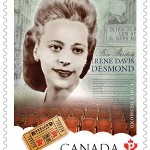
In 1946, Viola Desmond refused to sit in blacks-only section of movie theatre.
by Stephen Kimber
Another February. Another African Heritage Month. Another plaintive plea — from me and a few lonely others — for an official day to honour Viola Desmond’s contribution to the human rights movement in Canada.
On November 8, 1946, Desmond, a pioneering black businesswoman from Halifax, found herself stuck in New Glasgow overnight. She decided to see a movie. The Dark Mirror, starring one of her favorite actresses, Olivia de Haviland, was playing at the Roseland Theatre.
In 2010, the Nova Scotia government publicly apologized and officially pardoned her for her “crime.” A motion to make November 8 Viola Desmond Day passed second reading. Then…nothing.
Viola Desmond sat, by chance, in a whites-only section. Informed she would have to move, Desmond refused. She was dragged from the theatre, clapped in jail, hauled before a magistrate, tried without benefit of a lawyer, summarily convicted of failing to pay a one-cent (!) amusement tax and fined $20.
Although an appeal of her conviction ultimately failed on a technically, Desmond’s spontaneous, principled stand helped energize the not-over-yet fight for equal rights in this province — nine years before Rosa Parks equally symbolic refusal to sit in her “proper” place on a bus is credited with sparking the American civil rights movement.
Desmond’s importance has belatedly begun to be acknowledged.
In 2010, the Nova Scotia government publicly apologized and officially pardoned her for her “crime.” That same year, a Tory backbencher introduced a motion in the legislature to make November 8 Viola Desmond Day. The bill passed second reading.
And then…
Nothing.
African Nova Scotian Affairs Minister Percy Paris disappeared the bill into the black hole of “community consultation” — not on how best to honour Desmond but on the generically correct issue of “how to establish a lasting form of recognition that would honour the contributions and experiences of African Nova Scotians.”
No one seems quite certain what happened after that, except there is still no day to honour Desmond… or any other African Nova Scotian civil rights pioneer.
“We have an apology, a pardon and a Canada postage stamp,” notes Ron Caplan, the Cape Breton historian who published a book about Desmond written by her sister and continues to champion the idea of a Viola Desmond Day. “We have two books and we even have annual celebrations of a Viola Desmond Day at [Toronto’s] Ryerson University.” But we still don’t have our own, teachable-moment Viola Desmond Day here in Nova Scotia.
© Copyright 2013 Stephen Kimber, All rights Reserved. Written For: StraightGoods.ca
 Stephen Kimber is the Rogers Communications Chair in Journalism at the University of King's College in Halifax. He is an award-winning writer, editor and broadcaster.
Stephen Kimber is the Rogers Communications Chair in Journalism at the University of King's College in Halifax. He is an award-winning writer, editor and broadcaster.
Sorry, the comment form is closed at this time.